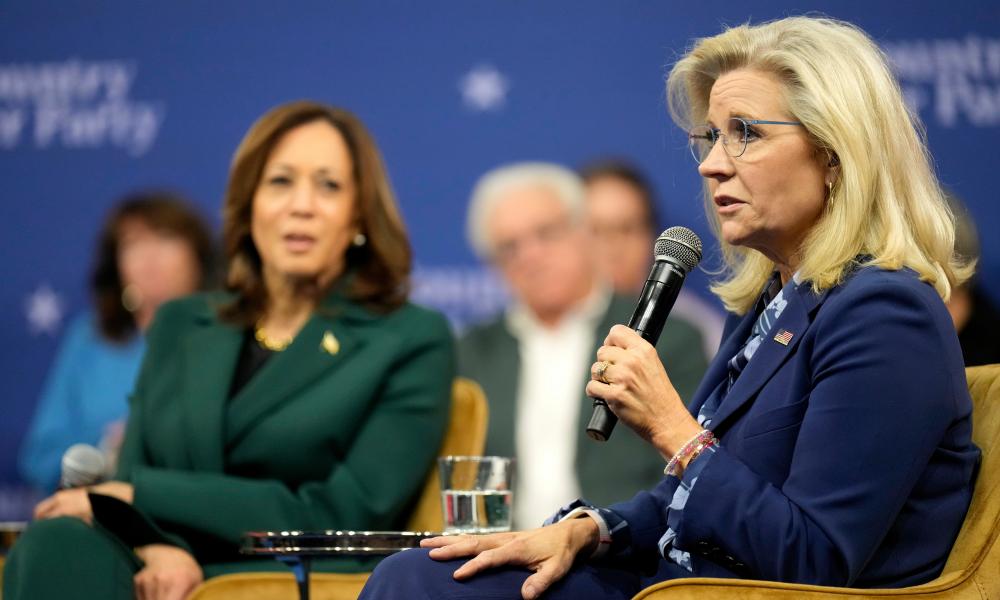Liz Cheney, a former Republican congresswoman and a notable critic of Donald Trump, has taken a bold stance against abortion bans enforced by the GOP, advocating for support of Vice President Kamala Harris in the upcoming elections. Cheney made these remarks during the first of three joint events with Harris in swing states, intending to attract moderate Republican voters away from Trump. As one of the most prominent conservative voices aligning with Harris, Cheney has been suggested as a potential candidate for a position in a Harris cabinet. At a gathering in a suburban area near Philadelphia, Cheney highlighted the troubling implications of the Republican stance on abortion after the Supreme Court’s 2022 Dobbs decision, which eliminated federal protections for the procedure.
Cheney expressed concern that some state legislatures have overstepped by restricting abortion rights in ways that jeopardize women’s health. She shared that although she has traditionally held pro-life views, observing the consequences of these laws has prompted her to reconsider her stance. She specifically referred to instances where women are being denied necessary medical care, emphasizing the urgency for conservatives to acknowledge the harm these policies can cause. Cheney’s statements underscore a growing sentiment among certain segments of the Republican base that the party’s current approach to abortion is untenable. The event showcased Cheney’s effort to provide encouragement for fellow conservatives to join Harris’ cause, particularly as Harris campaigns for restoring Roe v. Wade protections through legislative action.
During the series of events featuring both Republican and Democratic leaders, Cheney’s endorsement of Harris specifically sought to unify voters across party lines in support of reproductive freedom. Her strategy coincided with the locations chosen for the events, which included counties previously won by Republican candidate Nikki Haley during the primaries. Haley, having taken a stance that promotes states’ rights concerning abortion, has sought to dilute its significance in the electoral debate. Cheney’s willingness to publicly ally with Harris highlighted her growing discontent with the Republican direction, especially in light of her vocal opposition to Trump and the events surrounding the January 6 Capitol riot.
Vice President Harris emphasized a collaborative approach to governance, indicating that she would be open to including Republicans in her administration if elected. This potential for bipartisanship was framed within the context of America needing constructive, fact-based political discourse, which Cheney wholeheartedly supported. As they engaged the audience, the two leaders showcased their shared belief that an effective governing strategy can transcend partisan divides and address pressing national concerns, including the crisis of trust in government institutions fueled by political extremism.
Despite the overarching themes of unity and pragmatic problem-solving, Cheney’s participation in campaign events alongside Harris raised eyebrows, particularly regarding her hawkish foreign policy stance. Given Michigan’s demographic makeup of Arab Americans, some critics questioned the effectiveness of this partnership, especially in light of the Biden administration’s foreign policy decisions, particularly concerning the ongoing crisis in Gaza. As tensions between the political factions continue to rise, these concerns illustrate a complex interplay of voter sentiment and the strategic calculations being made by both Democrats and any conservative allies hoping to shift the political narrative.
In response to Cheney and Harris’s campaign efforts, Trump openly criticized the collaboration as a sign of political opportunism. His disparaging remarks further emphasized the tension within the Republican Party and its challenge in reconciling the party’s traditional values with the more extreme elements represented by Trump and his followers. Cheney, however, maintained her commitment to upholding constitutional principles, framing her advocacy as a matter of national interest. Her call for Republicans to prioritize integrity and stability over Trump’s “erratic” approach to governance positions her within a controversial but potentially influential role in the current political landscape. Over a hundred former Republican officials joined in support of Harris, underscoring an emerging coalition of conservatives willing to break from party orthodoxy in pursuit of a more constructive political future.

